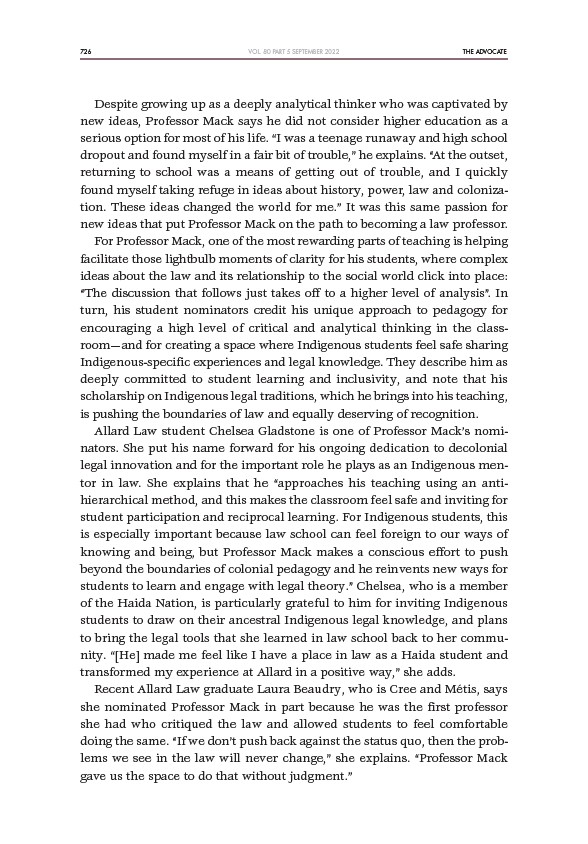
726 THE ADVOCATE
VOL. 80 PART 5 SEPTEMBER 2022
Despite growing up as a deeply analytical thinker who was captivated by
new ideas, Professor Mack says he did not consider higher education as a
serious option for most of his life. “I was a teenage runaway and high school
dropout and found myself in a fair bit of trouble,” he explains. “At the outset,
returning to school was a means of getting out of trouble, and I quickly
found myself taking refuge in ideas about history, power, law and colonization.
These ideas changed the world for me.” It was this same passion for
new ideas that put Professor Mack on the path to becoming a law professor.
For Professor Mack, one of the most rewarding parts of teaching is helping
facilitate those lightbulb moments of clarity for his students, where complex
ideas about the law and its relationship to the social world click into place:
“The discussion that follows just takes off to a higher level of analysis”. In
turn, his student nominators credit his unique approach to pedagogy for
encouraging a high level of critical and analytical thinking in the classroom—
and for creating a space where Indigenous students feel safe sharing
Indigenous-specific experiences and legal knowledge. They describe him as
deeply committed to student learning and inclusivity, and note that his
scholarship on Indigenous legal traditions, which he brings into his teaching,
is pushing the boundaries of law and equally deserving of recognition.
Allard Law student Chelsea Gladstone is one of Professor Mack’s nominators.
She put his name forward for his ongoing dedication to decolonial
legal innovation and for the important role he plays as an Indigenous mentor
in law. She explains that he “approaches his teaching using an anti-
hierarchical method, and this makes the classroom feel safe and inviting for
student participation and reciprocal learning. For Indigenous students, this
is especially important because law school can feel foreign to our ways of
knowing and being, but Professor Mack makes a conscious effort to push
beyond the boundaries of colonial pedagogy and he reinvents new ways for
students to learn and engage with legal theory.” Chelsea, who is a member
of the Haida Nation, is particularly grateful to him for inviting Indigenous
students to draw on their ancestral Indigenous legal knowledge, and plans
to bring the legal tools that she learned in law school back to her community.
“He made me feel like I have a place in law as a Haida student and
transformed my experience at Allard in a positive way,” she adds.
Recent Allard Law graduate Laura Beaudry, who is Cree and Métis, says
she nominated Professor Mack in part because he was the first professor
she had who critiqued the law and allowed students to feel comfortable
doing the same. “If we don’t push back against the status quo, then the problems
we see in the law will never change,” she explains. “Professor Mack
gave us the space to do that without judgment.”